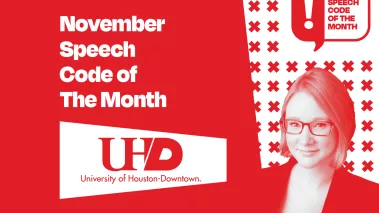Table of Contents
Unconstitutional University of Houston-Downtown policy bans ‘offensive’ emails

What speech “could be construed as abusive or offensive”? The better question is what speech couldn’t be construed as such. This language is unconstitutionally vague: For that reason, a University of Houston-Downtown policy that bans offensive speech is putting students’ rights in danger.
UHD’s student handbook states that students “shall not” use their university email to send messages or postings “that may be used to intimidate, harass, create an offensive atmosphere, or that could be construed as abusive or offensive.”
This policy — maintained by a public university bound by the First Amendment — has earned its place as FIRE’s Speech Code of the Month for November.
Deciding what speech is considered abusive or offensive is entirely subjective. As a result, a government ban on offensive speech requires the person who administers it to discriminate based on viewpoint — something the Supreme Court has struck down as unconstitutional, time and time again.
As the University of Houston system knows all too well, it’s best to revise these issues before a First Amendment lawsuit hits.
For example, in Texas v. Johnson, the Court wrote: “If there is a bedrock principle underlying the First Amendment, it is that the government may not prohibit the expression of an idea simply because society finds the idea itself offensive or disagreeable.”
This principle applies just as much to expression through online messages or postings as it does to in-person speech on campus.
And the part of the policy that bans messages or postings that could be used to create an offensive atmosphere is chilling as well. If someone forwards your email to another student, and that student thinks it creates an offensive atmosphere, are you in trouble too?
Realistically, there’s no way UHD is cracking down on every potentially offensive email sent with a UHD email address; that would be impossible. But a policy like this makes it all too easy for the administration to target disfavored points of view, or to build a case against a “problem” student. Because it is so clearly and substantially restrictive, it earns FIRE’s worst, “red light” rating for policies regulating expression, putting UHD in the bottom 12% of public schools FIRE rates.
UHD must revise this policy to narrowly target speech and conduct that aren’t protected by the First Amendment, like true threats and harassment. FIRE’s Model Code of Student Conduct and page of model policies maintained by other universities are a good start, and FIRE’s policy reform team is happy to consult one-on-one with UHD and other universities to revise their policies — free of charge.
As the University of Houston system knows all too well, it’s best to revise these issues before a First Amendment lawsuit hits.
Recent Articles
FIRE’s award-winning Newsdesk covers the free speech news you need to stay informed.

California and other states are rushing to regulate AI. This is what they’re missing

One day after FIRE lawsuit, Congress passes changes to filming permits in national parks

VICTORY: FIRE lawsuit leads California to halt law penalizing reporters, advocates, and victims who discuss publicly known information about sealed arrest records


